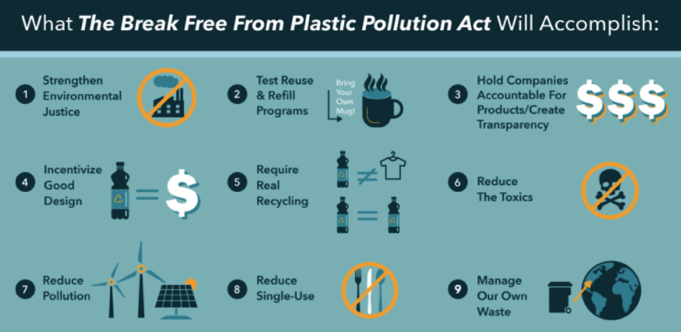Newton’s Representative Jake Auchincloss has signed on as a co-sponsor of the Break Free From Plastic Pollution Act (H.R. 5845) that was introduced in the United States House of Representatives last year and reintroduced on March 23, 2021. This session’s bill is off to a strong start with 86 original co-sponsors in the House and 11 original co-sponsors in the Senate, which is more than the bill garnered at the end of last session.
Your help is needed to generate more support. You can take action in support of the bill by signing the Surfrider Foundation’s petition for the Break Free From Plastic Pollution Act.
Every year, about 11 million metric tons of plastic waste escapes into the ocean from coastal nations. The United States generates the most plastic waste per capita of any country in the world and is among the top contributors to plastic pollution in the coastal environment, either illegally dumped in the U.S. or collected in the U.S. for recycling and exported to countries where it was inadequately managed. This bill recognizes that we cannot recycle our way out of this problem and provides a comprehensive approach to reduce plastic pollution, including policies to reduce unnecessary plastic packaging and shift responsibility to producers, as well as to improve recycling infrastructure.
The reintroduced Break Free From Plastic Pollution Act will:
- require producers of packaging, containers, and food-service products to design, manage, and finance waste and recycling programs;
- launch a nationwide beverage container refund program to bolster recycling rates;
- ban certain single-use plastic products that are not recyclable;
- ban single-use plastic carryout bags and place a fee on the distribution of the remaining carryout bags, which has proven successful at the state level;
- establish minimum recycled content requirements for beverage containers, packaging, and food-service products;
- channel massive investments in U.S. domestic recycling and composting infrastructure.
- prohibit plastic waste from being shipped to developing countries;
- protect state and local governments that enact more stringent standards;
- require EPA to partner with the National Academies of Science to conduct a comprehensive study on the environment and cumulative public health impacts of incinerators and plastic chemical recycling facilities;
- and establish a temporary pause on permitting new and expanded plastic production facilities while the EPA creates and, as necessary, updates regulations on plastic production facilities to protect frontline and fenceline communities from direct and cumulative impacts on public health.



Recently on Twitter